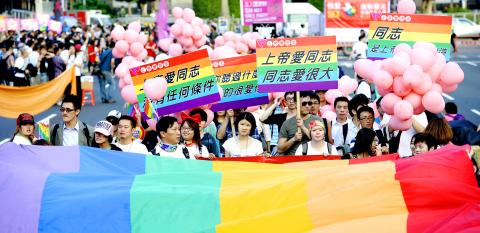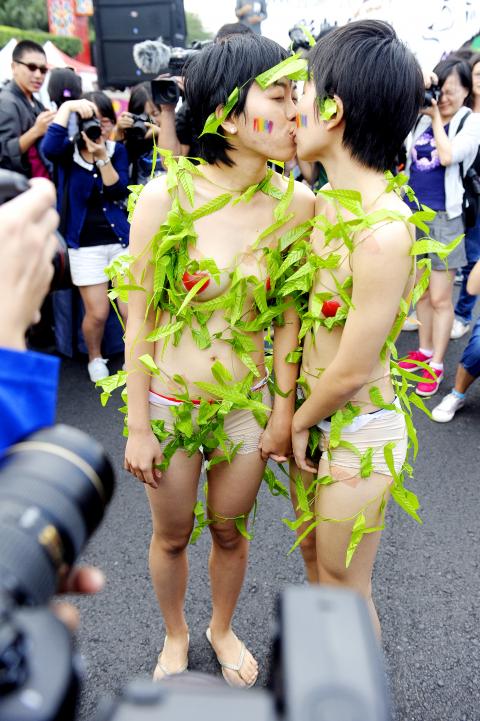The annual Taiwan LGBT Pride Parade takes place this afternoon, with more than 50,000 people expected to fill the streets of downtown Taipei.
Now in its 10th year, the Pride Parade has come a long way since it first started with a relatively small group of 500 lesbians, gays, bisexuals, transgenders and their supporters. Now it’s one of Asia’s largest LGBT pride parades, known not only for its festive carnival atmosphere, complete with rainbow flags and flamboyant costumes, but also as a platform for social causes.
This year’s theme centers on same-sex marriage, and is entitled “I Do! Do I? Equal Rights to Marriage, Diversity in Partnership” (革命婚姻 婚姻平權 伴侶多元). Organizers are seeking to draw attention to the lack of institutional and legal rights for same-sex couples.

Photo: tsorng chang-jiin, taipei times
“We think the right to marry is a basic human right,” said Chen Chia-yu (陳家玉), one of the conveners and spokespersons for this year’s parade. “And whether or not a person actually wants to get married, marriage should be a basic right that all citizens have.”
Same-sex couples should be allowed the same legal protections that married heterosexual couples have, she says. “If [one partner in a same-sex couple] gets in an accident, and has to go to the hospital, that person’s partner might not be granted visitation rights. Or when someone passes away, they can’t give their inheritance to their partners.”
Taiwan first attempted to legalize marriage and adoption for same-sex couples with the proposal of the Basic Human Rights Law (人權基本法) in 2003, but the bill never passed in the legislature.

Photo: tsorng chang-jiin, taipei times
But the Pride Parade organizers are also looking beyond legal issues surrounding same-sex marriages. They want Taiwanese society to reconsider the traditional notions of marriage and family to allow for a “diversity in partnerships” such as same-sex relationships and heterosexual couples without children.
Chen says the institution of marriage is such that men and women are encouraged to have children, but doesn’t account for “different kinds” of families and relationships. One simple example, she says, is same-sex or heterosexual couples without children. They face the challenge of receiving proper care when they become elderly, particularly in a society where children traditionally look after their parents in their old age, she says. “Our country hasn’t paid much attention to these issues.”
Other causes and issues will also be covered at tomorrow’s parade, with groups devoted to HIV/AIDS awareness, labor rights — and even protesting the construction of the Miramar Resort in Taitung — slated to attend the march.
The procession starts at the Presidential Office on Ketagalan Boulevard (凱達格蘭大道) at 2pm and splits in two. The north route follows Zhongshan South Road (中山南路), Qingdao East Road (青島東路), Changan East Road (長安東路), Nanjing East Road (南京東路) and Linsen South Road (林森南路). The south route follows Zhongshan South Road to Roosevelt Road (羅斯福路) and passes through Hoping East Road (和平東路) and Jinshan South Road (金山南路).
Both processions will converge on Renai Road (仁愛路) and return to the Presidential Office, where the parade ends with speeches and performances from activist and rights groups, as well as a “massive group hug-in,” according to Chen. There will also be performances from Hong Kong singer Anthony Wong (黃耀明), who notably announced he was gay during a concert earlier this year, acclaimed Aboriginal singer/songwriter Suming (舒米恩) and environmental activist and new age musician Matthew Lien.
Chen, who is one of the parade’s 300 volunteers, has seen the parade grow quickly. She marched with 15,000 people when she first participated in 2007 and witnessed that number grow to over 50,000 last year. The parade also attracts visitors from Hong Kong, Malaysia, Singapore, Japan and the Philippines.
When asked about the progress of LGBT rights over the past decade, Chen says activists are finding more “diverse” ways to promote their platform. But she laments what she sees as dithering responses from government officials regarding issues such as same-sex marriage.
Chen notes that in recent years presidential candidates (including both President Ma Ying-jeou (馬英九) and his predecessor Chen Shui-bian, 陳水扁) voiced their support for gay marriage but backtracked after winning office. “They say they must follow the consensus of society, but the numbers of people [who support same-sex marriage] keeps growing ... so how many people do we actually need to call it a consensus?”
“When it comes to the right to marry, it’s not about how many people support it,” she said. “When [LGBT couples] are not granted protection and rights, this is harmful to them. We hope the government can step up its efforts and better understand what’s happening.”
For more details, visit: twpride.org

April 28 to May 4 During the Japanese colonial era, a city’s “first” high school typically served Japanese students, while Taiwanese attended the “second” high school. Only in Taichung was this reversed. That’s because when Taichung First High School opened its doors on May 1, 1915 to serve Taiwanese students who were previously barred from secondary education, it was the only high school in town. Former principal Hideo Azukisawa threatened to quit when the government in 1922 attempted to transfer the “first” designation to a new local high school for Japanese students, leading to this unusual situation. Prior to the Taichung First

Chinese Nationalist Party (KMT) Chairman Eric Chu (朱立倫) hatched a bold plan to charge forward and seize the initiative when he held a protest in front of the Taipei City Prosecutors’ Office. Though risky, because illegal, its success would help tackle at least six problems facing both himself and the KMT. What he did not see coming was Taipei Mayor Chiang Wan-an (將萬安) tripping him up out of the gate. In spite of Chu being the most consequential and successful KMT chairman since the early 2010s — arguably saving the party from financial ruin and restoring its electoral viability —

The Ministry of Education last month proposed a nationwide ban on mobile devices in schools, aiming to curb concerns over student phone addiction. Under the revised regulation, which will take effect in August, teachers and schools will be required to collect mobile devices — including phones, laptops and wearables devices — for safekeeping during school hours, unless they are being used for educational purposes. For Chang Fong-ching (張鳳琴), the ban will have a positive impact. “It’s a good move,” says the professor in the department of

Article 2 of the Additional Articles of the Constitution of the Republic of China (中華民國憲法增修條文) stipulates that upon a vote of no confidence in the premier, the president can dissolve the legislature within 10 days. If the legislature is dissolved, a new legislative election must be held within 60 days, and the legislators’ terms will then be reckoned from that election. Two weeks ago Taipei Mayor Chiang Wan-an (蔣萬安) of the Chinese Nationalist Party (KMT) proposed that the legislature hold a vote of no confidence in the premier and dare the president to dissolve the legislature. The legislature is currently controlled